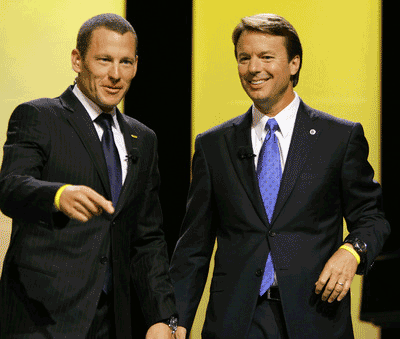In a nation torn apart over a war in a faraway land, cancer could become a consensus point, it looks like.
Cyclist Lance Armstrong seems to be succeeding in his efforts to push cancer funding to the top of the national agenda as the presidential election is nearing.
At the presidential forums he organized at Iowa the last two days, those candidates who showed up agreed that there was a dire need to step up funding, of course the Democrats were far more vociferous.
Only two of the eight Republicans cared to take part, unwilling as they were to take public position on raising resources for cancer funding. Still the two forums attracted a good audience and commentators believe it is a step forward.
The Democratic candidates attacked the Bush administration for cutting research money to the National Cancer Institute.
'The current administration has literally called a halt in the war against cancer,' Hillary Clinton said, adding that 'the president of the United States has been leading an assault on science and research.'
She herself had to face some embarrassing moments when her rival John Edwards blamed her for being too close to industry lobbyists.
Advertisement
'I believe that the insurance companies, the drug companies and their lobbyists killed the healthcare reform that was attempted in the 1990s by Sen. Clinton, and we applaud her for her work. But I think they're the people who killed it,' Edwards said.
Advertisement
Clinton maintained that industry contributions she has received as a candidate have not stopped her from pushing expanded healthcare initiatives and changes in pharmaceutical regulations.
'I believe in working with everybody and being influenced by nobody,' Clinton said. 'I think that the idea that we need a national health-care system is great, and I'm all for it and I'm going to make sure that it happens.'
Whatever the exchanges among themselves, the fact remains all the four Democrats committed themselves to at least doubling the $5 billion spent annually for cancer research—in other words, to backing a 'surge' in the long-neglected war on cancer. Considering that cancer kills 550,000 Americans a year (that’s 1,500 a day—the leading cause of death for those under 85), it’s about time. As Bill Richardson said, 'it's pathetic' that we now spend the same in two weeks in Iraq as we spend all year fighting cancer.
The candidates also said expansion of health-care coverage to the millions of uninsured Americans was crucial to fighting cancer. 'We so desperately need universal health care,' Edwards said.
He took note of the millions of people with cancer who don’t have the advantages he and his wife Elizabeth enjoy. They lose all their money, he said, on top of getting sick. But even the Edwardses cannot read their incomprehensible medical bills.
And Edwards, along with the other candidates, believes that insurance companies often limit necessary treatment. He also noted that only two in 10 proposals for cancer research get funded these days. This is driving young reseachers out of oncology toward other fields, dramatically slowing the search for cures. Until recently, when cancer budgets were cut by President Bush, it was five of 10.
On the second day of Lance Armstrong’s Livestrong Presidential Cancer Forum, only two of the eight invited Republican candidates showed up.
Senator Brownback, himself a melanoma survivor, scored some points by emphasizing his efforts to ease the availability of experimental drugs for end-stage cancer patients, which the FDA continues to make difficult, at a cost of thousands of lives.
He, however, refused to be pinned down on cancer research funding. He said he wanted to start with a pledge to end cancer deaths in ten years, then assess how much money would be required. Arkansas Governor Mike Huckabee talked about a food-stamp program that would offer financial incentives for healthy choices, so that a dollar in food stamps would buy $1.25 worth of fruit and vegetables but only 75 cents worth of junk food.
Both had to wrestle a lot of questions on health-related issues at the forum, and that is a welcome change from the usual campaign din.
Every candidate will now be asked: Do you favor doubling the funding for cancer research? And if not, to what better use would you put that money?
Ultimately, politicians are forced to deal with the real issues in people’s lives. With cancer touching every family in the country, we may be seeing the beginning of new priorities in the big tent of American politics, columnist Jonathan Alter remarked.
Source-Medindia
GPL/C









